How learning to pilot a helicopter cured my fear of flying
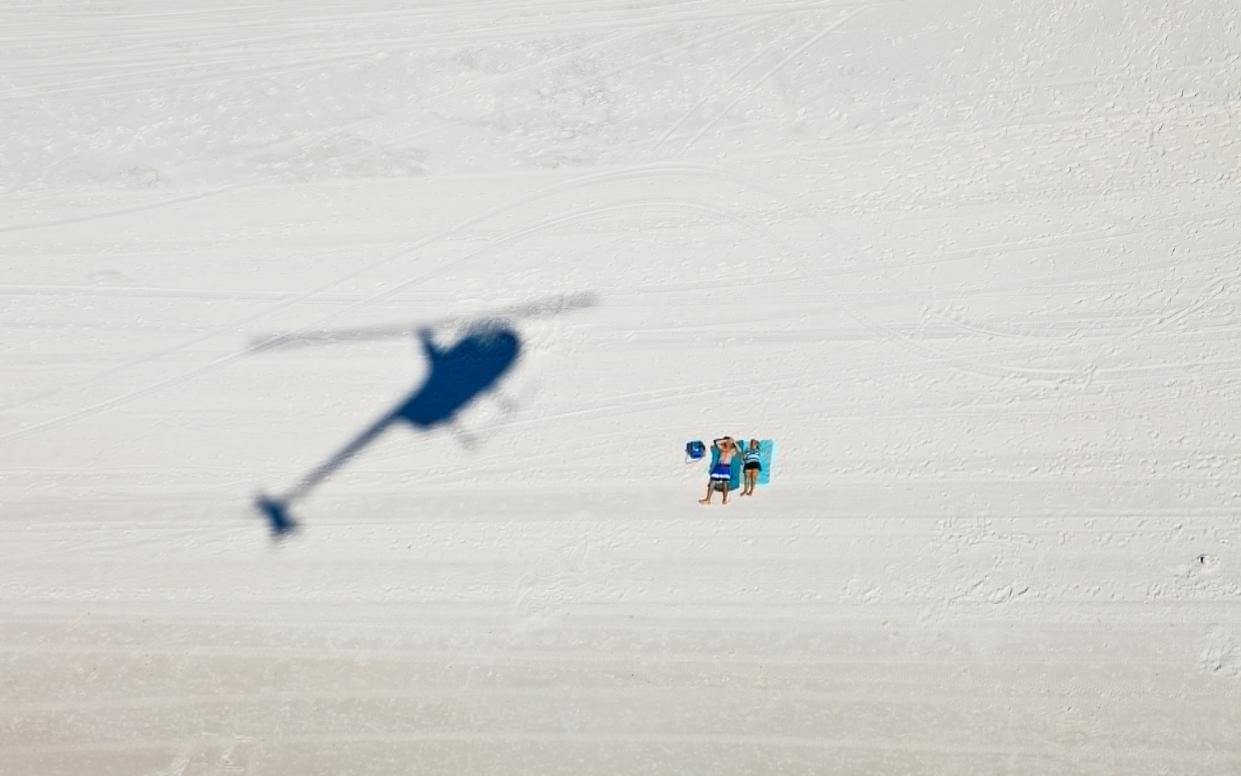
My hatred of flying was well known for years. The thought of getting into an aluminium tube, sidestepping into Row 28 and hurtling through the air at the mercy of an unknown pilot is one I’ve long found deeply unnerving. I’d grin and bear it for the sake of family holidays, but I’d never dreamed of setting foot in a helicopter or light aircraft.
So it was, to put it mildly, a moment of extreme inner turmoil and desperation that drove me to Denham Aerodrome in Buckinghamshire one bright spring morning six years ago, aged 50.
My husband of 26 years and the father of our three children had separated from me and our marriage had fallen apart. After finalising the divorce, and with our children grown up and installed at boarding school or university, I found myself alone with only the dog for company.
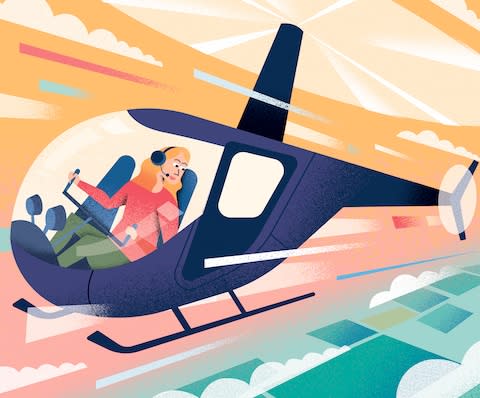
There were two options: spend a fortune on a psychotherapist (I tried it but it wasn’t for me) or do something so out of my comfort zone that I’d be forced from the dark recesses of self-analysis and distracted from my impending personal crisis. Learning to fly appeared to be the solution, unorthodox though it sounds.
My father piloted Spitfires during the Second World War and I had fond early memories of aerodromes, men in uniform and oily rags. So though terrifying, bizarre and – to friends and family – wholly bonkers, my decision to get a helicopter pilot’s licence felt exhilarating, liberating and strangely grounding. Proving I’d so dramatically moved on was an added bonus.
In numbers | How to get a helicopter pilot licence
What I could never have realised when I climbed into that Robinson R44 – a light four-seater helicopter – for the first time was how drastically it would change my life. I can still recall the extraordinary sense of weightlessness on taking off and freedom as we breezed over fields, hedgerows and houses. Seeing everything from above was empowering. I was hooked.
Learning to hover a helicopter, one of the first things you’re taught at flying school, is a mindfulness exercise more powerful than all the books and meditation clips you could ever read or watch – like trying to balance on a ball without slipping off. All thoughts disappeared as I focused on the job in hand. It was the best sort of release as I realised how much more there was to life. I also had to spend hours learning the principles of flight for theory exams on aviation law, navigation and the weather.
The airfield can be a place for unexpected meetings. I’ve had an earnest discussion with the actor Tom Cruise on the subject of turbine lag while he was practising flight scenes for one of the Mission Impossible films, which was surreal. Just being in the hangar can mean you get asked to give people lifts. Paddy (my new husband, whom I married after bonding over heated debates about aviation risk management) has flown Made In Chelsea’s Georgia “Toff” Toffolo as a favour when they were stuck in traffic, and I’ve flown to the home of Jay Kay of Jamiroquai.
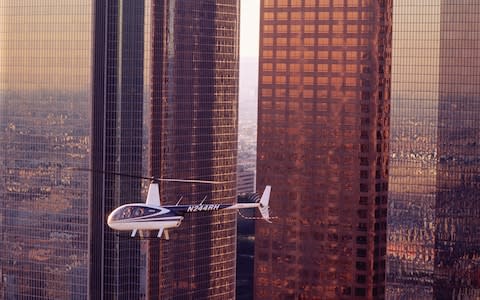
A year after first stepping into a helicopter and with 70 hours of flying time, I was awarded a licence. Five years on, my life is unrecognisable. I split my time between Holland Park in London and Suffolk, where I live with Paddy. We own a Robinson R44, bought second-hand for £120,000 (although a smaller two-seater Robinson R22 can cost as little as £60,000, the price of a Land Rover Discovery) and commute back and forth. It’s opened up the world. I’ve flown low over the Alps, above whales in the Mediterranean and sharks in the Bahamas. If we want to have lunch in Bruges, we do. At weekends, we’ve had lunch in Suffolk, dinner in Oxford then flown to Scotland for the day.
Together we’ve launched two companies – Helipaddy and Helisafari – with more in the pipeline including a potential commuter shuttle service from Dorset to London for those who don’t want to drive on a Friday night.
The 15 airports that all pilots love flying to
Helipaddy was born around the kitchen table in 2013 out of our frustration with outdated information about heli-friendly destinations, particularly hotels and restaurants. Having got our licences, we wanted to know where we could land. You don’t need an official helicopter pad, only a flat space about the size of a tennis court. The Helipaddy app lists more than 10,000 places to land, from a boutique hotel in Scotland to chateaux in France and an iconic hotel in Norway.
Helisafari organises multi-day helicopter tours of large geographical areas. So far we’ve travelled on group trips the length and breadth of Scotland, Scandinavia and Africa, to places you could never hope to reach by car, train or foot.
Of course, travelling by helicopter is far from cheap but in some instances it can cost less than a first-class flight. Fuel costs about £100 per hour in an R44 four-seater, which can be split four ways. Both businesses have carried myself and Paddy on the most incredible adventures. The greatest was on our honeymoon, during a flight from Crete to Cape Town.
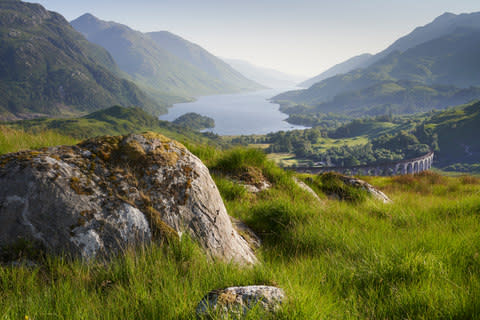
We were dual-piloting a helicopter alongside a convoy of pre-Second World War biplanes recreating an Imperial Airways route. It was certainly not everyone’s idea of a romantic getaway, but the private tour group needed a helicopter escort and we thought it a once-in-a-lifetime opportunity. I had to pinch myself gliding over Egypt and down through Sudan in 104F (40C) heat with a flock of ancient aircraft humming alongside us like a flock of ducks. But it all went wrong at Ethiopia’s Gambela Airport when we stopped to refuel. Armed police became aggressive, shouting and locking all 50 of us in a small room following a dispute over landing permissions. They couldn’t believe the entourage that had landed and thought we were spies, troublemakers or insane.
We stayed there for three days, sleeping on the floor with nothing to eat but eggs bartered for with our guards. Eventually someone found a loose door and snuck out to grab a mobile phone from one of the aircraft. Someone in the group was best friends with the wife of former US secretary of state John Kerry. A call was swiftly put through and we were soon sent on our way.
Our touring helicopter safaris are far less dramatic, although weather always plays a part. On a recent four-helicopter tour to the ski resort of Megève in France, it was apparent from forecasts that the weather ahead was becoming unfavourable. We had to plot a 1,000-mile detour to Scandinavia instead, ending up in a restaurant called Smakbyn on a group of islands between Finland and Sweden. There we feasted on Nordic crayfish, goats cheese and heritage tomatoes.
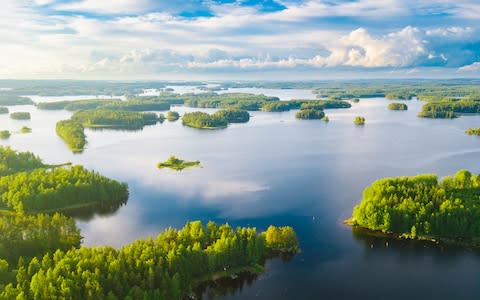
From there, we flew to the Dutch island of Texel – the location of the last European battle of the Second World War – and stayed at Hotel Texel near the Slufter nature reserve. Each morning we unfurled maps across the breakfast table to debate where the wind might blow us next. Part of the fun is the sense of camaraderie and mission that develops. You have to be flexible, unflappable and with a keen desire to expand your horizons.
Of my three sons – Harry, now 29, James, 26, and Marcus, 24 – the youngest two have got their helicopter pilot licences, taking their lessons in our helicopter which we lend for training to Denham Aerodrome to help with costs. For us, it has been the best money we’ve spent.
A couple of weekends ago, the boys woke up to blue skies so flew from our home in Suffolk to the north-west Norfolk coastline with our terrier, Hovis, and labradoodle, Tate, for a long walk on the beach and lunch; we were back in time for tea. The only downside, with so many pilots in the family, is the back-seat flying, which can be horrendous. Thankfully, there’s an isolator switch that I can use to tune them out when it becomes too much – because, as I’ve learned, there is nothing more peaceful than soaring above the countryside.
The essentials
Full access to the Helipaddy app (helipaddy.com) costs £29.99 per year.
Destinations with Helisafari (helisafari.com) include Scotland, Croatia, Morocco and Scandinavia.
HQ Aviation (hqaviation.com) at Denham Aerodrome has information on lessons. A private pilot’s licence costs from £15,000 and the Civil Aviation Authority requires a minimum flight time of 45 hours.
Once qualified, you could fly to: Knockinaam Lodge, south-west Scotland (3 hr 45 min from London); Chateau La Cheneviere, Normandy (1 hr 20 min); Juvet Landscape Hotel, west Norway (9 hr); St Mark’s Square, Venice (5 hr); or Chateau de Chailly, France (2 hr 45 min).
As told to India Sturgis